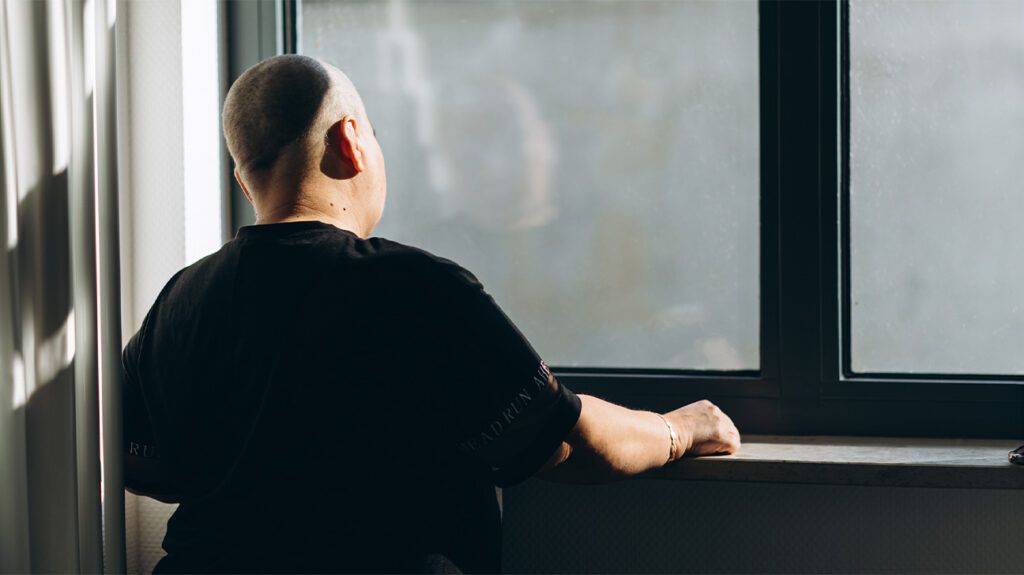Chemotherapy is a type of cancer treatment that uses medications to kill fast-growing cancer cells. Depression may be one of the possible side effects of chemotherapy.
Chemotherapy medications travel through the body and can mistakenly attack and damage healthy cells. This can leave a person with several side effects, which can be painful, change a person’s appearance, and affect their mood.
This article discusses whether there is a connection between chemotherapy and depression, if depression is common in people with cancer, and treatment options for depression during cancer treatment.
This article also includes personal stories from Dr. Kubanych Takyrbashev, the health and wellness advisor at NAO, who has experience with chemotherapy and depression.

Depression is a mood disorder
- loss of interest in previously pleasurable activities
- stress
- anxiety
- low energy
- fatigue
- difficulty sleeping
Chemotherapy is a powerful type of cancer treatment that can be invasive and take a toll on the physical and mental health of a person. Chemotherapy can cause several side effects,
- hair loss
- weight loss
- pain
- nausea
- vomiting
- cognitive changes
- fatigue
- weakness
- changes to the skin and nails
A 2021 study suggests that approximately 41% of people undergoing chemotherapy treatment, may experience depression. However, it is difficult to determine whether depression is a direct result of chemotherapy or partly due to the cancer diagnosis, and side effects a person experiences.
Although, a
However, the research suggests that it is difficult to confirm whether this is due to the length of chemotherapy treatment itself or due to the stress that the ongoing costs of long-term chemotherapy can cause.
Read more about the side effects of chemotherapy.
Dr. Takyrbashev’s story: My experience with depression during chemotherapy
Apart from the visible side effects, I experienced a profound sense of isolation. The time spent in treatment centers, the physical changes, and the necessity to take breaks from regular activities led to a feeling of disconnection from friends and family, potentially contributing to depression.
Certain medications that can help to reduce nausea due to chemotherapy may also have a link to depression. This may be due to the medications decreasing the amount of dopamine the brain produces, which can lead to depression.
Taking
According to the American Cancer Society,
Research from 2017 suggests that a person with cancer is five times more likely to develop depression than a person without cancer. The same research also suggests that a person with a brain tumor or thyroid cancer may experience more severe depression.
The American Cancer Association suggests that depression can develop
According to Cancer Research UK, it is typical for a person to develop depression once they have finished cancer treatment.
Dr. Takyrbashev’s story: How depression affected me after chemotherapy
After finishing treatment, there’s usually a period of adjustment that isn’t talked about much.
I found it challenging to establish a new routine and cope with the emotional low after the intense treatment. This time led to unexpected feelings of emptiness or depression as I adapted to life after chemotherapy.
Although 2018 research suggests that antidepressants can interact with chemotherapy treatment and may make some cancer symptoms worse, there are some types of antidepressants that may be safer.
If a person with cancer does decide to take antidepressants, the safer options
Dr. Takyrbashev’s story: How I coped with depression during and after chemotherapy
Journaling became my lifeline during and after chemotherapy. Writing allowed me to pour out my emotions, fears, and hopes onto paper, giving me a safe space to express what I couldn’t always articulate aloud. It was a journey of self-discovery, as each entry revealed layers of resilience I didn’t know I had.
Tracking my progress, no matter how small, became a source of motivation and a reminder of how far I’d come. Reflecting on setbacks helped me find new perspectives and strategies for coping. Through journaling, I found clarity amidst the chaos and a sense of accomplishment in documenting my journey toward healing.
- regular physical activity where possible
- engaging with everyday life and social activities
- following a nutritious diet
- attending psychotherapy or cognitive behavioral therapy (CBT)
Trying to maintain a regular bedtime routine and waking time, avoiding alcohol, quitting smoking, and not using recreational drugs
Depression resources
Visit our dedicated hub for more research-backed information and in-depth resources on depression.
Chemotherapy is a type of cancer treatment that involves powerful medication to kill fast-growing cancer cells.
There are several side effects of chemotherapy, such as hair loss, weight loss, pain, fatigue, nausea, vomiting, and cognitive impairment. These side effects can change the appearance of a person and impact how a person feels.
The stress of a cancer diagnosis and the side effects a person experiences may lead to depression.
Chemotherapy may also lead to depression due to the medication causing behavioral and brain changes which are separate from the stress and anxiety a cancer diagnosis can bring.
There may also be a link between other cancer medications, such as steroids, and a person with cancer developing depression.
If a person undergoing chemotherapy receives a diagnosis of depression, there are a small number of antidepressants that may be suitable and safe, such as SSRIs.
A person receiving chemotherapy can help to manage symptoms of depression by eating a healthy, nutritious diet, and staying as physically active as possible.
Cancer resources
To discover more evidence-based information and resources for cancer, visit our dedicated hub.
